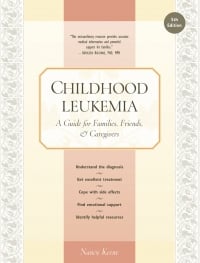Childhood Leukemia
Camps
Summer camps for children with cancer, and often their siblings, are becoming increasingly popular. These camps provide an opportunity for children with cancer and their siblings to have fun, meet friends, and talk with others in the same situation. Counselors are usually cancer survivors and siblings of children with cancer, or sometimes oncology nurses and resident physicians. At these camps, children can have their concerns addressed in a safe, supportive environment that is supervised by experts. Camps provide a carefree time away from the sadness and stress at home or from the all-too-frequent hospital visits.
Of all the ways to get support, I think the camp really helps the most. You are all there together for enough time to break down the barriers. Although camp does not focus on cancer, many times we really got down to talking about how we really felt. I have been a counselor at the camp for eight summers now. Most of the campers know that I relapsed three times and I’m doing great many years later. They see the many other long-term survivors who are counselors, and it gives them what they need the most—hope. The best support is meeting survivors, because nobody else truly understands.
• • • • •
Caitlin went to camp, and this was a dream come true for her. As we pulled into the parking lot, she exhaled a deep breath and said, “I made it. I am finally normal!”
Some camps are set up to accommodate not only the child who has undergone treatment, but also their siblings and parents. Some camps offer separate weeklong camping experiences just for siblings. Appendix B, Resource Organizations, contains a short list of camps with contact information. To view a comprehensive list, visit www.acor.org/ped-onc/cfissues/camps.html.

It’s like your psyche has been hit by a truck. Some days the pain is worse than others. Some days your threshold is stronger than others, but allow yourself the help that is available to get back to stable. Take it from me—it is next to impossible to pull from a dry well. Unlike children, we can’t temper tantrum ourselves out of our feelings, we can’t rant and scream and stomp our feet at the unfairness of it all. We can’t just sit in momma’s arms and have a hug and feel better. We have to handle it with an attitude and the responsibility that is expected of being adult. And we have to be a nurse, teacher, mom, emotional measuring stick for our kids, care for the marriage, pay the bills, and, oh yeah, don’t forget about ourselves—all at the same time. It’s just far too much. Say “Yes” to yourself, and your needs—get help when you need it. Other things that I found helpful were:
- Saying “No,” “No, thank you,” and “I’ll take that into consideration when I make my decision”
- Saying “Yes,” “Yes, please, that would be a great help,” and “Sure, if you could drop off a lasagna and pick up some milk on your way over that would be great”
- Writing in a journal
- Taking a retreat weekend
- Playing cards with the girls
- Counseling (on occasion with priest, psychologist, social worker)
- Having movie night with my sisters (usually a comedy—you are allowed to laugh)
- Treating myself to an inside-and-out car wash
- Allowing myself to “cry in my cornflakes,” then getting up, splashing some cold water on my face, and getting on with the day
- Enjoying a glass of wine, a candle, and Andrea Bocelli
- Gardening
- Having coffee with a friend
- Helping someone else who is in worse shape than I am
- Talking with other cancer kid moms about cancer kid family stuff
- Talking with non-cancer kid moms about non-cancer family stuff (the kids bickering, too much housework, the latest magazine, and what the women in it are wearing)
- Declaring the next five minutes as “get the crazies out” time, and tickling, dancing silly, and playing “make me laugh” (you know you’re losing it when you do this, and no one else is home)
- Going out with my husband (even if I had to drag him, we always enjoyed the evening in spite of ourselves)
And anything else I deemed necessary to help me get through it.
Table of Contents
All Guides- Introduction
- 1. Diagnosis
- 2. Overview of Childhood Leukemia
- 3. Acute Lymphoblastic Leukemia
- 4. Acute Myeloid Leukemia
- 5. Juvenile Myelomonocytic Leukemia
- 6. Chronic Myelogenous Leukemia
- 7. Telling Your Child and Others
- 8. Choosing a Treatment
- 9. Coping with Procedures
- 10. Forming a Partnership with the Medical Team
- 11. Hospitalization
- 12. Central Venous Catheters
- 13. Chemotherapy and Other Medications
- 14. Common Side Effects of Treatment
- 15. Radiation Therapy
- 16. Stem Cell Transplantation
- 17. Siblings
- 18. Family and Friends
- 19. Communication and Behavior
- 20. School
- 21. Sources of Support
- 22. Nutrition
- 23. Insurance, Record-keeping, and Financial Assistance
- 24. End of Treatment and Beyond
- 25. Relapse
- 26. Death and Bereavement
- Appendix A. Blood Tests and What They Mean
- Appendix B. Resource Organizations
- Appendix C. Books, Websites, and Support Groups

